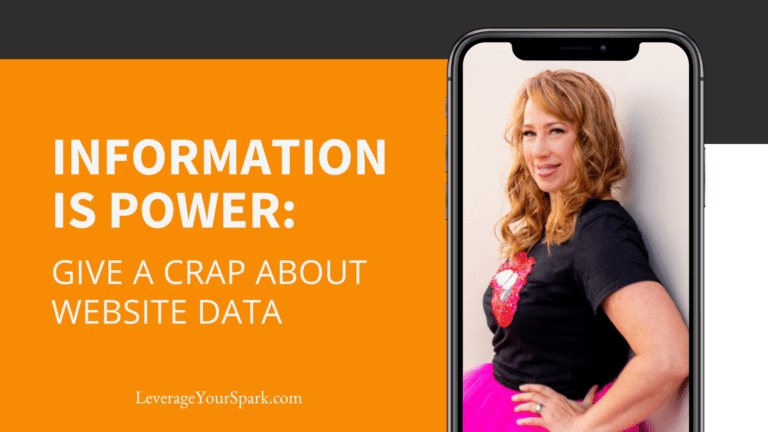Information Is Power: Give a Crap About Website Data

On the surface, no one sees just how sexy data from your website is. It’s so much easier to talk about design, fancy effects, and what you “like” rather than what the business goals are and what needs to happen to get those results. But information is power, and the more you know, the better equipped you will be to generate business from your website.
Data makes us accountable to what we want and how a business website can help us get that. That’s why it is sexy and so important that you use it.
Listen to Season 1: Episode 14
How Information Is Power
Information is power, and websites are powerful tools, especially when it comes to helping us get information on how people use the website. We can literally know every view, scroll, click, hesitation, submission, and more. You don’t get that kind of insight with a brochure, poster, print ad, or networking meeting.
Knowing the right information to track and how to use that information to further the business goals is the secret sauce. Unfortunately, most businesses aren’t getting there. That’s because they don’t know that they care. In my experience, that has a lot to do with not realizing how to go about using the data.
Why Collect Data Anyway?
The purpose of collecting data on your website (or from any other digital marketing effort) is to enable intelligent decisions and reduce trial and error. Hence, information is power. I’ve found this to be especially true in areas where personal opinion tends to creep in. And website design is always on the usual suspect list for that. So is ad design.
Quick story: At my last corporate job, I was involved in the hiring process for marketing positions, and every single time, the candidates would bring up how “bad” the checkout experience was on the website and their ideas on how to fix it. What they failed to realize was the checkout experience was crafted specifically from data, and it worked the way it did because it was getting results.
To get from data to decision and then action takes more than a single step.
First, you have to look at the data. Then you have to be able to use it to develop insights about what that data is telling you. This is why it is handy to remember to stay curious when reviewing your data. It’s also why reports are useful—so you can purposefully be surfacing the most important metrics.
Your Information-gathering Starting Point
Before you start implementing any kind of data collection, you need to know what you want to learn about the users who visit your website. Information is power only if you have the right metrics and know how to track that data.
When you know this, you’ll accomplish two things:
- You’ll know that you are, indeed, looking at information that matters to you.
- You’ll be able to combat overwhelm by discerning what’s important.
Too much of anything is just, well, too much. And while information is power, too much information can rend you nearly powerless from decision fatigue. Don’t laugh; this is a very real issue when running a business.
In support of not adding to the overwhelm, create your system for getting from data to action. There’s no single recipe for success, but creating yours does require you to think through:
- the results you want
- how to measure the leading and lagging indicators
- how you “surface” that information and use it for insights (reports, review meetings, consultation appointments)
- how to make decisions and take action
Pro tip: Prioritize the most important decisions for your website and get the data to support those. This isn’t all or nothing; you can build out your metrics one at a time.
Data > Reports > Insights > Decisions > Action
When you have a plan in place to capture and use metrics on your website, you’ll find that you make decisions more easily, and you’ll have increased confidence in those decisions (bye-bye, debating personal options!).
Due to the fact that (the right) information is power, you’ll:
- stop wasting time, mental effort, and other resources (like your energy and cold-hard cash) on decisions or trial and error
- have a way to verify decisions or course correct because you’ll have the data and use it
Most of all—and this is a highly undervalued benefit—you’ll learn to ask better questions about your website and your users.
What change can you make this week to help you better use the data on your website or collect the right data so you can use it? Hit me up on social and let me know. I’m really interested in hearing how you put this information into practice.

